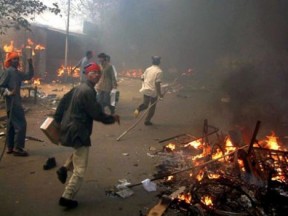[This article was published in ‘Communalism Combat’s’ tenth anniversary issue in 2003. However, the arguments still remain relevant.]
10 years is a numerically compulsive occasion for retrospection. Both for Javed Anand, Teesta Setalvad and their team, and for those well-wishers like us who have seen them wage a lonely battle since 1993. The introspection bit has to be done by the rest.
Communalism Combat (CC) , a magazine that Javed and Teesta run completes 10 years and was born out of a need. Ground realities have not changed much since its birth – what has, are the electoral exigencies of those who stoke the communal cauldron. The need remains, and so long as this malaise is not weeded out, the magazine will have to keep making foes and friends. Realities still stand stark and ominous. For someone who chances on CC issues once in a while on news stands, it would be pompous on one’s part to pass judgement on CC’s 10 years. That would be as a reader. But, for someone who has been trenchantly against communalism ever since his philosophical and ideological convictions took root, one does have a few points to make about the endeavour’s relevance.
Since ground realities remain the same and communal tension flows in undercurrents, it necessarily means people have become pathologically resistant to such factors. Issues such as Ayodhya et al have become hackneyed and insipid. They linger on in the news because newspapers choose to keep them that way. Give these issues an ignominious burial and Ayodhya will recede to where it belongs – nebulous mythology. But this is not what CC needs to do immediately; the mainstream media will keep temples and mosques in the news. People are certainly more immune now; they have better things to do than take cognisance of under-clad mendicants and over-clad charlatans.
Living is tough, anyway. But people still react – violently – to immediate incidents. The Godhra conflagration is too fresh in everyone’s minds to be cited as an example. And so are the diabolical roles played by the riot masterminds. It is this aspect that CC has focussed on always, and must keep on doing. Demagogues must be stripped bare every time they fan such fires. Most big newspapers are too busy either going colour or issuing advertisements quibbling about who sells more.
Both the CC team and their well-wishers have other tasks on hand too. If people like us alone read the magazine, it does not serve its purpose. Those bitten by the communal bug must read it and consequently shun those who believe that primal frenzy is the only road to salvation. The idea behind CC is not to perfunctorily expose or write; the idea is essentially to communicate the same. The ideas have to reach out to more people – those who are either afflicted or are immune, and those who participate in the macabre mayhems of mutilation.
Bigger challenges lie ahead. On the one hand, CC must ensure that more people read what they write. On the other hand, they have to tread a thin line between sensitising the immune, assuaging the wounds of the afflicted, and drilling some sense into hypersensitive zealots. And when this issue rolls off the press, I will be passing my copy around among those who have never seen a CC issue, or have never heard of it, or have never given a damn. I hope others do as much. If the word is spread, the message will trickle out somehow.
To know more about Communalism Combat, check out www.sabrang.com
Subir Ghosh is a New Delhi-based independent journalist and writer. He has worked with the Press Trust of India (PTI) and The Telegraph, and handled publications/communications for the Centre for Science and Environment (CSE), the Federation of Hotels and Restaurant Associations of India (FHRAI), and the Wildlife Trust of India (WTI). He specialises in Northeast affairs and is an advisory council member with the Centre for Northeast Studies (C-NES). He is the author of ‘Frontier Travails: Northeast – The Politics of a Mess’ published by Macmillan India, and has won two national awards in children’s fiction. His subjects of interest include conflict, ethnicities, wildlife, human rights, poverty, media, and cinema. He blogs at www.write2kill.in







Relevant.
Important.